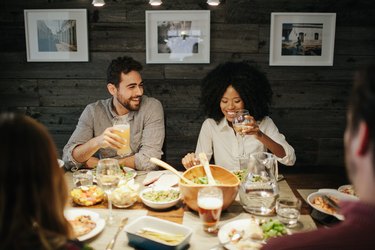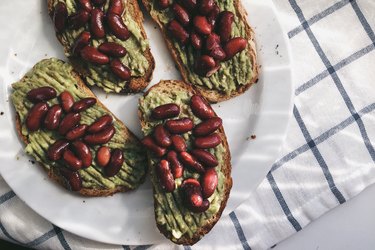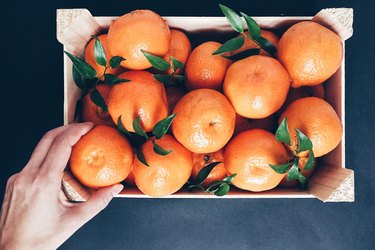
Whether you're enjoying a night on the town or hosting a dinner party, there are some foods you'll want to avoid pairing with your boozy beverages. Certain food-and-alcohol combinations can prevent nutrient absorption, while others can cause acid reflux or bloating. Find out which pre-game and late-night snacks you'll want to stay clear of the next time you're drinking
1. Salty Snacks
Video of the Day
There's a reason why you don't want to "break the seal" when you're out drinking. Alcohol has a diuretic effect, meaning that it causes your body to produce more urine. It blocks the release of a hormone needed for water reabsorption, which can also lead to dehydration. Know what else causes dehydration? Salty snacks like chips and pretzels.
Video of the Day
"Salty foods make you thirstier, which may lead you to drink even more alcohol to quench your thirst," says Lauren Harris-Pincus, registered dietician founder of Nutrition Starring YOU and author of The Protein-Packed Breakfast Club. The solution? "Have a full glass of water (or two) between alcoholic beverages," and opt for fresh veggies, cheese or nuts for a snack.
Read more: 9 Scary Side Effects of Social Drinking
2. Pizza
Brace yourself for bad news: Your go-to after-party indulgence, a.k.a. pizza, could give you gastroesophageal reflux disease (GERD). Basically, it's repeated acid reflux. Alcohol can cause GERD by delaying stomach emptying and decreasing tension in your lower esophageal sphincter, which typically prevents the backflow of the stomach's contents.
And unfortunately, tomatoes, which have a high acid content, have also been shown to increase the risk of GERD, acid reflux and heartburn. That means anything that contains a tomato-based product — looking at you, marinara sauce — is a bad match for a stomach full of alcohol.

3. Beans (With Wine)
Pairing a glass of wine with dinner may help you unwind from a long day, but if you're running low on iron, you might want to swap your go-to red with a craft beer or cocktail. Wine contains tannins, which are bitter-tasting polyphenols that come from the skins, seeds and stems of grapes.
These mouth-puckering compounds decrease your body's ability to convert absorbed nutrients into new body substances, says registered dietitian nutritionist Sara Haas. In other words, tannins prevent your body from properly absorbing iron and other beneficial nutrients. So it's best to skip wine on evenings when you're eating iron-rich foods like beans, dark, leafy-greens and whole grains.
4. Bread (With Beer)
If you've ever felt extremely bloated after downing some bread and beer, you might have experienced candida overgrowth, or an excess of yeast in your digestive system. That's because beer and bread both have high yeast contents, says Tasneem Bhatia, M.D., a certified nutritionist and expert in integrative health.
When brought together, they can cause bloating and constipation — symptoms of candida overgrowth — she says. Try to avoid yeast-heavy foods while drinking your favorite brew, and instead opt for veggies, nuts or lean meats instead.
5. Coffee and Energy Drinks
If you've ever been given a cup of coffee to help sober up, that refreshed feeling you get after chugging some joe is actually just a facade. Caffeine masks the depressant effects of alcohol, making you feel less drunk than you actually are, according to the Centers for Disease Control and Prevention.
This could explain why people who add caffeine to their cocktails are more likely to get into a traffic accident and make decisions that they later regret than people who have their drinks the old-fashioned way. And like tomato-based sauces, coffee and energy drinks are highly acidic. As a result, when combined with alcohol, they can cause acid reflux, heartburn and GERD.
6. Diet Soda
You might be trying to negate the excessive calories you're getting from alcohol by opting for a zero-calorie mixer. But unfortunately, swapping diet soda into your rum and Coke might push your buzz over the edge. According to a 2019 study from Northern Kentucky University, alcohol, when consumed with a diet beverage, results in a higher blood alcohol concentration (BAC) than it does when mixed with a sugar-sweetened drink.
Sugar slows down the absorption of alcohol from the stomach into the bloodstream. So it's not that diet soda speeds up intoxication, but rather that regular soda slows it down. Consider opting for a lightly-sweetened soda instead of a diet beverage and worry about calories at brunch tomorrow morning. "This is especially important if you plan on driving home," Harris-Pincus says.
Read more: How to Drink, Have Fun AND Lose Weight

7. Citrus Fruits and Juices
Sorry, mimosa lovers, you might want to find a new brunch cocktail. Citrus fruits' high acid content make them a poor companion for alcohol — if you want to avoid acid reflux and heartburn, that is. Might we suggest an Aperol spritz to go with your avocado toast?
Read more: 5 Brunch Cocktails With Healthy Ingredients
8. Fatty Foods
Pizza and potato chips are off the table, so what about fries? Nope. According to Harris-Pincus, high-fat foods can also cause acid reflux, heartburn and GERD, especially when eaten with alcohol.
According to the American Society for Gastrointestinal Endoscopy, fatty and fried foods relax the lower esophageal sphincter and delay stomach emptying — just like alcohol.
9. Chocolate and Peppermint
Put down that tub of mint chocolate chip ice cream. The cacao in chocolate is linked to acid reflux and GERD. It triggers the release of a large amount serotonin, a hormone that supports sleep and promotes happiness, into the intestines. That serotonin relaxes the lower esophageal sphincter (LES), preventing it from holding the contents of your stomach down.
Consequently, the cacao, caffeine and fat found in chocolate combine to create a trifecta of acid reflux-inducing ingredients. And consuming chocolate along with alcohol only makes matters worse. So where does peppermint come in? This refreshing herb also relaxes the LES, making it yet another risk factor for acid reflux and heartburn when combined with alcohol. Bummer!
Read more: The 10 Worst Foods for Acid Reflux
